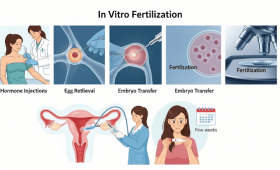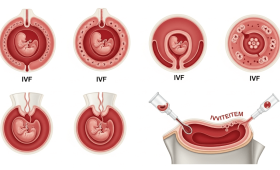Who Can Get IVF Treatment?
IVF treatment is a procedure applied to couples who cannot have children through natural means and have not achieved success with other assisted reproductive methods (such as IUI). According to Turkish law, it is mandatory for couples to be officially married and to use their own reproductive cells (eggs and sperm) to benefit from this treatment. The treatment offers a solution for infertility caused by both male and female factors.
Why is IVF Treatment Needed?
IVF treatment is needed when a couple fails to achieve pregnancy despite one year of regular, unprotected sexual intercourse. This period can be reduced to six months if the woman is over 35 years of age. There are many factors that cause infertility, and IVF treatment helps couples overcome these factors to have a child. This treatment can be an option not only for couples with infertility problems but also for those who want to prevent the transmission of a genetic disease to the baby.
What Are the Causes of Female Infertility?
There are many causes of infertility in women. The most common causes include blocked or damaged fallopian tubes. Ovulation disorders such as endometriosis (chocolate cysts) and polycystic ovary syndrome (PCOS), low ovarian reserve, and advanced maternal age are also significant factors. Uterine fibroids or polyps can also prevent a pregnancy from occurring.
What Are the Causes of Male Infertility?
Infertility in men is usually caused by problems with sperm. Low sperm count (oligospermia), insufficient sperm motility (asthenozoospermia), or sperm shape abnormalities (teratozoospermia) are common causes. In addition, the complete absence of sperm (azoospermia), genetic problems, varicocele (enlargement of veins in the testicles), or hormonal disorders can also cause infertility.
What is the Age Limit for IVF Treatment in Turkey?
The legal upper age limit for women for IVF treatment in Turkey is set to be up to the end of their 40th year. Treatment cannot be performed for women who have passed their 41st birthday. There is no legal age limit for men. This age restriction is intended to protect the health of the mother and baby, as the risks associated with pregnancy increase with age.
Is the Marriage Requirement Mandatory?
Yes, it is a legal requirement for couples who want to receive IVF treatment in Turkey to be officially married. Before starting the treatment, couples must present their marriage certificate. This rule aims to legally establish the child’s lineage and to protect the family structure. Unmarried individuals or couples cannot receive IVF treatment in Turkey.
Are Egg or Sperm Donations Legal in Turkey?
No, egg or sperm donation is not legal and is strictly prohibited in Turkey. Only the couple’s own reproductive cells can be used in IVF treatment. This rule is in place to ensure that the child is genetically related to their parents and to prevent ethical issues. This is an important difference for couples considering having a child through donation in foreign countries.
In What Cases is IVF Treatment Recommended as a First Option?
Although IVF treatment is generally recommended in cases where other methods have not been successful, it can be the first option in some cases. For example, IVF treatment may be directly recommended in situations such as when both of the woman’s fallopian tubes are blocked, the man’s sperm count is very low or there is no sperm (azoospermia), advanced maternal age, or there is a risk of a genetic disease being passed on to the baby.
Is IVF Suitable for Couples with a History of Recurrent Miscarriage?
Yes, IVF treatment can be a suitable solution for couples with a history of recurrent miscarriage. In these couples, if the cause of the miscarriage is a genetic abnormality, embryos are genetically screened with Preimplantation Genetic Testing (PGT). This allows only healthy and genetically normal embryos to be transferred, which significantly reduces the risk of miscarriage.
What is Unexplained Infertility and How is it Treated?
Unexplained infertility is a condition where the cause of infertility cannot be determined despite all tests and examinations. It makes up 10-15% of all infertile couples. In this case, doctors usually start with simpler treatments like IUI. If these treatments are unsuccessful, IVF treatment is recommended as the next step.
Can Cancer Patients Get IVF Treatment?
Before cancer treatment (chemotherapy or radiotherapy), egg or sperm freezing can be done to preserve fertility. After the cancer treatment is completed and deemed appropriate by the doctor, IVF treatment can be applied using the frozen eggs or sperm. This helps cancer patients preserve the hope of having a child after they recover.
Is There Any Importance of Body Mass Index (BMI) for IVF Treatment?
Yes, having an ideal body mass index (BMI) increases the success of IVF treatment. Being overweight or obese can negatively affect both egg and sperm quality. It can also increase the risks that may arise during and after pregnancy. Therefore, reaching an ideal weight before starting treatment is an important step to increase the chances of success.
Is Having Blocked Fallopian Tubes an Obstacle to IVF Treatment?
No, having blocked or tied fallopian tubes is not an obstacle to IVF treatment. In fact, women with blocked tubes are ideal candidates for IVF, because this condition prevents the egg and sperm from meeting naturally. Since fertilization takes place in a laboratory setting during IVF treatment, the tubes do not need to be functional.
What Should Couples with Recurrent IVF Failure Do?
Recurrent IVF failure is a physically and psychologically exhausting situation for couples. In this case, a more comprehensive investigation is carried out and the treatment plan is re-customized for the patient. Genetic tests on embryos, hysteroscopy for uterine adhesions, or additional tests for immune system problems may be performed. Cure Holiday works with clinics that specialize in this area.
How is IVF Applied in Cases of Azoospermia (Absence of Sperm)?
Azoospermia is the condition where there are no sperm in the male ejaculate. In this case, sperm is attempted to be obtained from the testicles using surgical methods (TESE, TESA, or microTESE). The sperm obtained with this method is then used to fertilize the eggs. If no sperm can be retrieved, different options such as donation (abroad) or adoption can be considered for the couple.
Is IVF Suitable for Women with Polycystic Ovary Syndrome (PCOS)?
PCOS is a hormonal disease that leads to ovulation disorders. Women with this syndrome generally respond well to the medications used in IVF treatment. However, the risk of ovarian hyperstimulation syndrome (OHSS) may be higher. Therefore, this risk is minimized by applying special monitoring and treatment protocols.
Does Chocolate Cyst (Endometriosis) Affect the Success of IVF Treatment?
Endometriosis can lead to the formation of ovarian cysts (chocolate cysts), which can negatively affect egg quality and reserve. It can also reduce the receptivity of the uterine lining. Therefore, IVF treatment may be more challenging in women with endometriosis. However, this condition does not make it impossible to achieve pregnancy; the chances of success can be increased with special treatment protocols and surgical operations.
What is the Importance of Psychological State in IVF Treatment?
IVF treatment can be a stressful and emotional process for couples. The anxiety and stress experienced during this process can negatively affect the success of the treatment. Therefore, it is important for couples to be psychologically ready for the treatment and to receive psychological support throughout the process. Health consulting firms like Cure Holiday also provide referrals for psychological support during the treatment process.

What Tests Are Done Before IVF Treatment?
Before starting IVF treatment, couples undergo a comprehensive fertility evaluation. The woman is asked for hormone levels (FSH, LH, E2, AMH), a uterine film (HSG), and an ultrasound examination of the ovaries and uterus. The man is asked for a sperm analysis (spermiogram) test to evaluate sperm quality and count. If necessary, additional genetic tests can also be performed.
What Documents Are Required for IVF Treatment?
The most important legal document required to start IVF treatment is the marriage certificate. In addition, a copy of the ID cards and passport photos taken within the last 6 months for both spouses are also required. For patients coming from abroad, having English translations of these documents prepared makes the process easier. Cure Holiday provides a detailed list of required documents to help you manage the process.
Can Couples Without Health Issues Also Get IVF Treatment?
If a couple has not achieved a pregnancy for a period of one year (or six months), which is defined as infertility, IVF treatment can be considered even if no specific health problem is found. This condition is called “unexplained infertility.” In this case, it is accepted that treatment is needed.
Can Couples Who Are Disease Carriers Undergo IVF Treatment?
Yes, couples who are carriers of a genetic disease but are not sick themselves can undergo IVF treatment to prevent the disease from being passed on to their child. In this procedure, Preimplantation Genetic Testing (PGT) is applied to the embryos to select those that are genetically healthy. This increases the chance of a healthy pregnancy.
What Lifestyle Changes Should Be Made During IVF Treatment?
Making healthy lifestyle changes during the treatment process increases the chances of success. It is important to quit smoking and alcohol, eat a healthy and balanced diet, maintain an ideal weight, and exercise regularly. In addition, staying away from stress and getting enough sleep also contributes positively to the treatment.
What Should Be Done if IVF Treatment Fails?
It is quite common for IVF treatment to fail on the first attempt, and it is important not to lose hope. In case of failure, you should review the treatment protocol with your doctor, investigate the reasons, and create a new plan for the next attempt. Many couples achieve success on their second or third try.
In What Cases is the Decision “No Hope” Given for IVF Treatment?
Giving a “no hope” decision for IVF treatment is a very rare situation in the medical world. However, if the woman’s egg reserve is completely depleted or the egg quality is very low, starting treatment may not be recommended. In these cases, alternatives such as donation (abroad) or adoption are considered for the couple.
What is the Process for Patients Coming from Abroad?
The treatment process for patients coming from abroad usually begins with an online pre-consultation. After all test results and medical history are evaluated, a personalized treatment plan is created, and the dates of travel to Turkey are determined. Cure Holiday manages all logistical details such as travel, accommodation, airport transfers, and interpreting services during this process, allowing patients to focus on their treatment.
How Does Cure Holiday Help Patients from Abroad?
Cure Holiday offers a comprehensive service that facilitates the entire treatment process for patients coming from abroad. A personal consultant is assigned to you at the beginning and this consultant stays with you from before the treatment to its completion. They handle communication with the clinic, arrange your appointments, organize your accommodation and transfers, and support you at every stage of your journey.
What Are the Treatments for Preserving Ovarian Reserve?
To preserve ovarian reserve, egg freezing is the most effective method for young women. In addition, a healthy lifestyle, avoiding stress, and a diet rich in antioxidants can also help preserve egg quality and reserve. Supportive treatments like PRP can also be tried for women with a low ovarian reserve.
Why is IVF Treatment Such a Comprehensive Process?
IVF treatment is not just an operation. It consists of many stages such as hormone therapy, regular check-ups, egg retrieval, embryo creation, genetic testing, and embryo transfer. Each stage is meticulously planned according to the couple’s health condition and their response to the treatment. This comprehensive process is necessary to maximize the chances of success.
What is the Importance of Couples Supporting Each Other?
IVF treatment is a shared journey for couples. Supporting each other during this process helps them stay emotionally stronger. Maintaining open communication, sharing feelings, and respecting each other’s needs makes the process less stressful. This plays a critical role in alleviating the psychological burden of the treatment.



